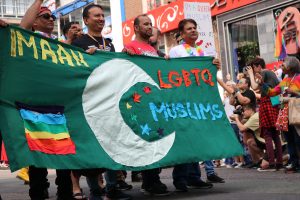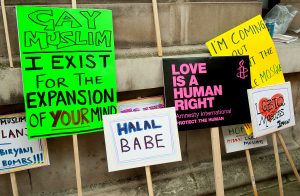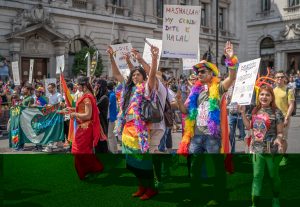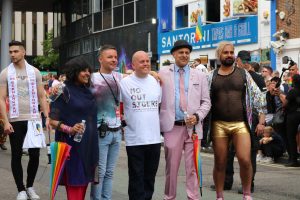
LGBTQ Muslim charity, Imaan, pictured at Brimingham Pride, 2019.
I’ve written in these pages previously about Section 28 of the Local Government Act 1988; a pernicious little sinew of discriminatory law that referred to homosexuality as a ‘pretended family relationship’. This year we celebrate the 50th anniversary of the Stonewall riots and the 30th anniversary of the eponymous charity that was the focal point of efforts to repeal Section 28 in the UK. However, amidst celebration of milestones have been some less encouraging scenes. In Birmingham, the teaching of an inclusivity curriculum, the No Outsiders programme, specifically its LGBT Section, has attracted the ire of parents.
Birmingham City Council has recently won a High Court injunction preventing protesters from congregating outside the gates of Anderton Park primary school as concerns for the wellbeing of students and teachers have mounted. Holding signs that read, ‘My child, my choice’ and ‘Let kids be kids’, these protests are predominantly (though not exclusively) constituted by Muslim parents. Their contention derives from their faith, insofar as they deem non-heterosexual relationships to be contradictory to the tenets of Islam. As with Section 28 however, the debate that surrounds this affair has contorted the underlying facts while some have consciously inflated and escalated the issue to the level of a culture war.
No Outsiders
Let’s go back to the beginning. I spoke with Colin Diamond, professor of educational leadership at the University of Birmingham, about No Outsiders, the programme at the heart of it all. It is based on the Equality Act 2010, “and therefore it addresses all of those groups that have protected characteristics. The aim is that the children understand that as a school community, nobody is an outsider. It doesn’t matter if you are a wheelchair user, a white kid, a black kid, a Muslim, a Sikh, a Jew, a Hindu, and in the context we’re talking about, if you’ve got two mummies, two daddies, one mummy, one daddy – it doesn’t matter. Everyone is to be valued and loved equally.” As reported in The Guardian, at Anderton Park, headteacher Sarah Hewitt-Clarkson devotes 0.5% of her annual timetable each year to teaching these characteristics, and has done for years.

Placards at London Pride 2016.
Vagueness
Much of the problem here comes from ambiguity. There has been a stunning lack of leadership from the Department for Education, who have issued mixed messages that have emboldened protesters and left headteachers to face them unarmed. There’s no conviction as to whether or not the teaching of LGBT content in primary schools is specifically required, even though its new legislation states that teaching should continue to chime with the ‘Equality Act, as it applies to relationships’. It also makes no concrete judgement about what is ‘age-appropriate’. Without the support of the DfE and government, headteachers are vulnerable to the accusation that there is some sort of agenda at play or that they are deliberately going above what the law demands.
Opposition
As with Section 28, there is a pair of insidious implications at work. First, that by simply informing children of the existence of LGBT relationships, their innocence is compromised. Second, that such teaching will encourage, promote, co-opt or convert children to ‘the gay lifestyle’. The same sorts of arguments have been made at every incremental advance of LGBT rights in this country, and they are as baseless now as they were then.
The idea that there is something innately promiscuous, licentious or sexually scandalous about non-heterosexuality derives from a belief that heterosexuality (and by extension marriage) is natural and divinely ordained. Because they don’t accept the fact that non-heterosexuality exists across nature and throughout human history (including in Muslim societies), sexual otherness is viewed as immoral perversion. The idea that children are more likely to become gay if they are taught that gay people exist is laughable. It’s so ridiculous in fact I refuse to believe anyone actually thinks that. What irks them is not that their child might be gay as a result of lessons at school, but that their child might grow up thinking that non-heterosexual relationships are acceptable, normal and worth celebrating. They fear this because to them it would represent a dilution of their identity as Muslims and of their rights as parents.
Opportunism
If there had been some degree of clarity from the DfE I doubt that the protests would have continued outside schools for this long. As they have been allowed to ferment, the initial issue has been supplanted into a more nebulous conflict that takes on elements of the culture war. The door has been left open for opportunists of different stripes to score points with inflammatory comments. Esther McVey, who has been consistently on the wrong side of history when it comes to LGBT rights, has said that “parents know best for their children”, Andrea Leadsom has said parents should have the right to decide when children are “exposed” to certain kinds of information. Certainly in the case of Esther McVey, her comments should be considered in the context of the Tory leadership race.

Proud Muslims march at London Pride 2018.
De-escalation
Homophobia is like a weed; just because it’s not on the surface, doesn’t mean it’s not waiting to sprout given the right conditions. In this case it is the vacuum left by the lack of governmental direction that has allowed these protests to take on a greater, more sinister dimension. Reasoned discussion has also broken down because the debate has been ossified into a dispute over rights, as opposed to wellbeing.
Lloyd Russell-Moyle MP called upon Theresa May to distance herself from Andrea Leadsom’s comments in Prime Minister’s questions. Openly gay and HIV-positive, he described how Section 28, for which Theresa May campaigned, left young people fearful of being LGBT. He described the safeguarding implications of letting children grow up without the knowledge of diverse relationship types. “This isn’t just about identity,” he began, “this is about safeguarding children so that they know what decent relationships are, that they know what abuse is. If you don’t teach these things, including an understanding about what a decent homosexual relationship is, you allow your children to be open to abuse and violence.”
In another way, we are suffering the hangover from the Section 28 era; as because some parents grew up without this knowledge, there is a degree of embarrassment when children come home with questions. “If a child comes home from school and wants to talk about complex maths, generally parents aren’t embarrassed to say ‘I don’t know that, let’s get your teacher to help you.’ We need to build a resilience for parents to be able to say that. But also, we need to build an understanding that if parents don’t have that confidence, it’s even more of a reason for these things to be taught by professionals in schools.”

Andy Moffat (centre) author the No Outsiders programme, pictured at Birmingham Pride, 2019.
To me, the tragedy at the heart of this issue is the very fact that legislation like the Equality Act 2010 and the system of education that supports it cannot be cherry-picked. To enjoy its protections in one area, but to deny others the same rights in another, is to undermine the law itself. We risk a dangerous precedent if that is allowed to continue. Equality for one is equality for all – no ifs, no buts, no maybes.
by Toby Hambly

